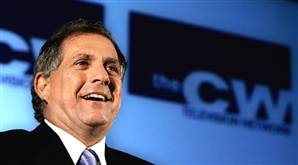
(Editors Note: There have been a few comments about what future over-the-air television or, as we know it, traditional TV has in the new media age with alternative choices. The following is an interview of CBS CEO, Les Moonves, that appeared in the February 2006 Newsweek that slightly touched on this same subject.)
Newsweek: The CBS Company has been tagged old media. Is your role to make it new?
MOONVES: No question. Our game plan is twofold. One, to be the best what we call traditional media operations—network, television stations, radio stations, outdoor business. But, as we look into the bold new world of new media, we're trying to jump in…in a big way. We are a first-rate content company, and we're looking at how to utilize that content in a hundred different ways.
What criteria do you use when deciding on these new digital-distribution deals?
Each deal is somewhat different, but they're based on the fact that more and more people want their content when they want it. They want to have the ability to look at an episode of "CSI" or "Survivor" whenever they want. We obviously picked two reality shows ["Survivor" and "The Amazing Race"], which people want to catch up on, as well as two procedural shows, "CSI" and "NCIS," primarily because these shows repeat extremely, extremely well. My guess is eventually you will see a majority of programming on all networks available in other ways. But we're putting our toe in the water before we dive in headfirst.
Why haven't you gone with iTunes yet?
We're talking to them. And I'm sure before too long we will be involved with them as well. They're looking for content—we're a content provider.
Will Internet television and on-demand mean the end of the prime-time schedule? Not at all. There are still 30 million people every week that watch "CSI." The world is not going to change overnight.
You say that people want to see content when and where they want it. But copy-protection schemes your industry is endorsing may make that very hard to do.
We have to respect the [content] property owner and not get into a situation, like the music business did, where people were taking the properties for free. Eric Schmidt, the CEO of Google, said at our retreat this morning that the public doesn't want to steal product, as long as you make it available at a reasonable price. That's exactly what we did with our Google deal. We're making it available to [the public] at a reasonable price [$1.99], so their tendency will not be to try to take a property that doesn't belong to them.
Google hopes to use its auction-based advertising model to sell ads on other media. Would you let it place ads on CBS radio and television?
That very well could happen. Google is a very forward-minded company, and we think they have a lot of good ideas on how to increase revenue for [us]. There's no reason why we won't be doing more with them in the future.
Have you personally watched video on small devices like cell phones or the iPod?
You know what? I have yet to see a full television show. I've certainly seen sports clips, and news clips, and clips of "CSI."
What's the place of news in this wide-open environment?
I don't think the network is a network without an evening newscast. It's our job to reinvigorate the franchise. The average age of the news viewer is a little bit old, and we want to make it a bit younger and make the news much more accessible.
Do you feel that the flagship of the news division will always be that early-evening half hour?
I don't know. Some may call "60 Minutes" our flagship. I don't want to rank them.
Do you read blogs?
Not usually. When it's something interesting, my people bring it to my attention. We are getting independent market research on how bloggers are treating some of our shows and personalities. Early on we knew "Ghost Whisperers" was going to be successful because Jennifer Love Hewitt had a lot of attention among bloggers. It would be silly to ignore blogs, and we don't.
What would be the scariest headline you could imagine in the business pages in the next year?
The scariest headline? CBS CORP. DOESN'T PERFORM AS WELL AS EXPECTED. But I don't think that's going to happen. Put that in, too.
© 2006 Newsweek, Inc.
Congress passed a law on February 1, 2006, setting a final deadline for the DTV transition of February 17, 2009. Most television stations will continue broadcasting both analog and digital programming until February 17, 2009, when all analog broadcasting will stop.." FCC www.dtv.gov
Made It Just In Time! The EYE Is Still Watching And Doesn't Like What They Can't (W)SEE.

No comments:
Post a Comment